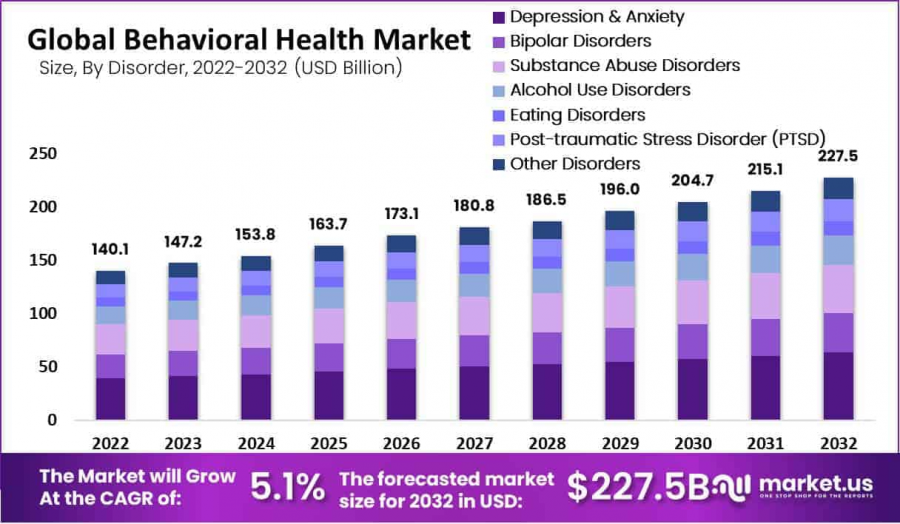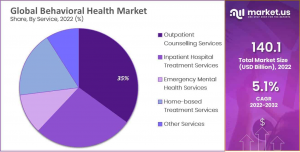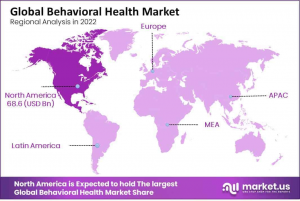
Behavioral Health Market Forecasted to Hit USD 227.5 Bn by 2032 | Segments Based On By Disorder, By Service
Global Behavioral Health Market size is expected to be worth around USD 227.5 Bn by 2032 from USD 147.2 Bn in 2023, growing at a CAGR of 5.1%
NEW YORK CITY, NY, UNITED STATES, January 22, 2025 /EINPresswire.com/ -- Report Introduction
Global Behavioral Health Market size is expected to be worth around USD 227.5 Bn by 2032 from USD 147.2 Bn in 2023, growing at a CAGR of 5.1% during the forecast period from 2023 to 2032. In 2022, North America led the market,~ generate revenue of US$ 68.6 Billion.
The global behavioral health market is gaining prominence as the importance of mental health and well-being becomes a central focus in healthcare systems worldwide. Behavioral health encompasses services for managing mental health disorders, substance abuse issues, and emotional well-being through integrated treatment approaches. With an increasing prevalence of mental health conditions such as depression, anxiety, and bipolar disorder, the demand for behavioral health services is rapidly rising.
Advancements in telehealth and digital platforms are revolutionizing access to behavioral health services, making treatment more accessible, especially in remote areas. Governments and healthcare organizations are launching initiatives to destigmatize mental health, ensuring more individuals seek help without fear of judgment. Programs such as the U.S. National Suicide Prevention Lifeline and similar global campaigns underscore the significance of addressing behavioral health challenges.
The market’s growth is further driven by increasing investments in mental health facilities, the integration of mental health services with primary care, and the rising use of evidence-based therapies. Regions like North America lead due to advanced infrastructure, while Asia-Pacific shows potential with growing awareness and healthcare reforms. The behavioral health market plays a vital role in promoting holistic healthcare, bridging the gap between physical and mental health, and ensuring improved quality of life for individuals globally.
Unlock Competitive Advantages With Our PDF Sample Report https://market.us/report/behavioral-health-market/request-sample/
Key Takeaways
• Market Size: Global Behavioral Health Market size is expected to be worth around USD 227.5 Bn by 2032 from USD 147.2 Bn in 2023.
• Market Growth: The market growing at a CAGR of 5.1% during the forecast period from 2023 to 2032.
• Mental Health Services: This market encompasses an expansive spectrum of mental health services, from therapy and counseling sessions to psychopharmaceuticals and even psychiatric care.
• Mental Health Crisis: Market leaders have responded to an emerging mental health crisis with solutions such as anxiety therapy and treating substance use disorder.
• Technology and Apps: Mental health apps and digital platforms have gained in popularity recently, offering tools for self-help, mood tracking, and meditation.
• Integrative Care: Integrating behavioral health services into primary healthcare can dramatically enhance patient outcomes while diminishing fragmented services.
• Mental Health Parity Laws: Numerous regions now enforce legal mandates mandating equal insurance coverage of mental and physical healthcare services to further market expansion.
• Regional Analysis: In 2022, North America led the market,~ generate revenue of US$ 68.6 Million.
How Artificial Intelligence (AI) is Changing the Behavioral Health Market?
Artificial Intelligence (AI) is revolutionizing the behavioral health market by enhancing diagnosis, treatment, and patient management. AI-powered tools can analyze large datasets to identify patterns and risk factors associated with mental health conditions, enabling early diagnosis and personalized treatment plans. Chatbots and virtual therapists, equipped with natural language processing (NLP), provide 24/7 support for individuals coping with depression, anxiety, and stress, reducing barriers to care.
Machine learning algorithms are being used to predict relapses in patients with substance abuse disorders or chronic mental health conditions, allowing for timely interventions. AI-driven apps and wearable devices help monitor mood, behavior, and physiological indicators, providing real-time feedback to both patients and healthcare providers. Moreover, AI streamlines administrative processes, such as scheduling and billing, enabling healthcare professionals to focus more on patient care. As AI continues to advance, it is set to play a critical role in making behavioral health services more accessible, efficient, and impactful.
Market Segments:
Based on Disorder
• Depression & Anxiety
• Bipolar Disorders
• Substance Abuse Disorders
• Alcohol Use Disorders
• Eating Disorders
• Post-traumatic Stress Disorder (PTSD)
• Other Disorders
Based on Service
• Outpatient Counselling Services
• Inpatient Hospital Treatment Services
• Emergency Mental Health Services
• Home-based Treatment Services
• Other Services
Buy This Premium Research Report@ https://market.us/purchase-report/?report_id=98340
Market Dynamics
• Driver: The increasing prevalence of mental health disorders significantly propels the behavioral health market. According to the National Institute of Mental Health (NIMH), over one in five U.S. adults experience mental illness annually. This high incidence necessitates expanded behavioral health services to address diverse mental health needs. Public health emergencies, such as the COVID-19 pandemic, have further exacerbated mental health challenges, highlighting the critical need for accessible and effective behavioral health care.
• Trend: The integration of behavioral health into public health monitoring and surveillance is an emerging trend. The Centers for Disease Control and Prevention (CDC) emphasizes the importance of incorporating behavioral health metrics into public health emergencies to better understand and address mental health impacts. This approach enables more comprehensive data collection and informed decision-making, ultimately improving mental health outcomes during crises.
• Restraint: Despite advancements, significant challenges persist in the behavioral health market, particularly regarding the availability of dedicated surveillance systems for monitoring behavioral health during public health emergencies. The CDC identifies a lack of established systems and consistent sociodemographic data collection as barriers to effective behavioral health surveillance. These limitations hinder the ability to fully understand and respond to mental health needs during crises, underscoring the necessity for improved data infrastructure and methodologies.
• Opportunity: The application of big data analytics presents a substantial opportunity in the behavioral health sector. The World Health Organization (WHO) highlights that big data can enhance patient-centric care, improve decision-making processes, and detect health threats. By leveraging large datasets, healthcare providers can gain insights into mental health trends, predict outcomes, and tailor interventions more effectively, thereby advancing the quality and efficiency of behavioral health services.
Competitive Landscape:
The behavioral health market is characterized by a mix of established healthcare providers, innovative digital platforms, and nonprofit organizations striving to address mental health challenges. Key players include Acadia Healthcare, Universal Health Services, and Magellan Health, which focus on offering comprehensive mental health and substance abuse treatments through hospitals and rehabilitation centers.
The market is also witnessing a surge in digital mental health solutions, with platforms like Talkspace, BetterHelp, and Cerebral leading the way. These platforms leverage telehealth and artificial intelligence (AI) to provide accessible and personalized therapy services, making behavioral health care more inclusive and convenient.
Nonprofit organizations and public health agencies play a significant role by launching awareness campaigns and providing community-based services. Collaborations between government bodies and private companies are driving innovation and expanding access to care. As demand for mental health services grows, competition in the behavioral health market continues to intensify, spurring further advancements.
Key Market Players:
• Acadia Healthcare Corporation
• National MENTOR Holdings, Inc.
• Behavioural Health Network Inc.
• Universal Health Services, Inc.
• Magellan Health, Inc.
• Bright Harbor Healthcare
• Centene Corporation
• Caretech Holdings, Plc
• Pyramid Healthcare, Inc.
• Other Key Players
Emerging Trends in Behavioral Health
• Integration of Technology in Mental Health Services: The increasing reliance on technology in healthcare is driving significant changes in behavioral health services. Digital platforms like teletherapy, virtual counseling, and mental health apps are making services more accessible and efficient. Technologies such as video consultations have made mental health care more affordable and scalable. For example, companies like Talkiatry have integrated virtual psychiatry and therapy services, ensuring patients can receive consistent care regardless of location.
The National Institute of Mental Health (NIMH) has supported the use of these digital tools to break down barriers, particularly in rural or underserved communities. This trend is reshaping how mental health care is delivered, making it easier to reach patients who previously may not have had access. Studies show that telehealth use surged by 154% during the pandemic, indicating a growing comfort with remote mental health services.
• Focus on Mental Health Post-Disaster: Natural and man-made disasters have highlighted the urgent need for behavioral health support, leading to a growing trend in post-disaster mental health care. Events such as hurricanes, wildfires, and pandemics significantly increase the need for mental health interventions. According to the Centers for Disease Control and Prevention (CDC), mental health conditions like PTSD, anxiety, and depression rise in communities affected by disasters.
In California, for example, the devastating wildfires in recent years have led to a significant increase in mental health services, with more people seeking help for trauma-related symptoms. This highlights the importance of integrating mental health services into disaster response plans and the growing recognition that mental health support is just as important as physical care in times of crisis. The CDC reports that at least 40% of people affected by disasters experience mental health issues, emphasizing the need for comprehensive care.
• Innovative Therapeutic Approaches: The emergence of innovative therapeutic techniques and treatments in behavioral health is a growing trend. While traditional therapy, such as Cognitive Behavioral Therapy (CBT), remains widely used, new, tech-driven treatments are gaining traction. For example, techniques like using video games (e.g., Tetris) have shown promise in reducing symptoms of trauma, especially in people affected by PTSD. Studies have shown that such interventions can help in disrupting the emotional response to traumatic memories by redirecting cognitive attention.
This new approach shows how behavioral health treatment is moving beyond conventional methods, integrating interactive, fun, and engaging platforms. The growing focus on using AI-driven tools and applications to assist in therapy or self-help for individuals with anxiety or depression is also growing. These innovations in treatment are opening new possibilities for those who previously had difficulty accessing or engaging with traditional therapies.
Use Cases in Behavioral Health
• Teletherapy Platforms: Teletherapy platforms have become one of the most transformative innovations in behavioral health care. With the rapid expansion of digital health services, platforms like Talkspace and BetterHelp are providing easy access to therapy from the comfort of one's home. During the COVID-19 pandemic, mental health challenges surged, and these platforms became a lifeline for many individuals. By connecting patients with licensed therapists via text, video, or audio sessions, they removed geographical barriers and reduced wait times for appointments.
According to the American Psychological Association (APA), more than 75% of mental health professionals reported offering telehealth services in 2021, demonstrating the increasing reliance on virtual care. This trend is likely to continue growing as patients seek the convenience and privacy of remote mental health services. Furthermore, these platforms often offer affordable options compared to traditional face-to-face sessions, making mental health support more accessible.
• Peer Support Applications: Peer support apps, such as Fello and 7 Cups, are revolutionizing how individuals with mental health conditions receive support. These platforms allow people facing similar challenges to connect, share experiences, and offer emotional support. Peer-led support has been shown to improve well-being, reduce feelings of isolation, and provide comfort.
This trend has been recognized by health organizations such as the World Health Organization (WHO), which has highlighted peer support as an important aspect of mental health care. A report by the WHO indicates that peer support can significantly improve the outcomes of individuals suffering from mental health conditions. The success of peer support apps is due to their ability to offer a non-judgmental space for users to open up and talk, helping them feel more understood and supported in their journeys to recovery.
• AI-Driven Mental Health Interventions: Artificial Intelligence (AI) is playing an increasingly important role in mental health interventions. AI technologies can analyze vast amounts of patient data to predict mental health conditions, recommend personalized treatment plans, and provide automated assistance to patients. For example, AI-based applications such as Woebot and Wysa offer cognitive behavioral therapy (CBT) through interactive chatbots, helping patients manage symptoms of anxiety and depression. Studies indicate that these AI-driven platforms can provide support 24/7, offering immediate access to care when needed.
Moreover, AI helps in monitoring patients' progress by continuously tracking their mental health status, identifying early signs of relapse, and ensuring timely intervention. The National Institute of Mental Health (NIMH) acknowledges the potential of AI in transforming mental health care by enabling more personalized and scalable treatments.
Lawrence John
Prudour
+91 91308 55334
Lawrence@prudour.com
Distribution channels: Healthcare & Pharmaceuticals Industry
Legal Disclaimer:
EIN Presswire provides this news content "as is" without warranty of any kind. We do not accept any responsibility or liability for the accuracy, content, images, videos, licenses, completeness, legality, or reliability of the information contained in this article. If you have any complaints or copyright issues related to this article, kindly contact the author above.
Submit your press release


